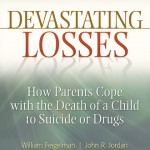 In addition to tugging on my heartstrings, Devastating Losses: How Parents Cope with the Death of a Child to Suicide or Drugs captivated my clinical quest for knowledge. The authors combined personal stories of survivors who lost children to suicide or drug related deaths with a profundity of solid quantitative research and clinical experience. This book begins with the personal journey of two of the authors who experienced the suicide of their own son and explores their devastations, emotional struggles, and the healing processes they encountered. The authors have published multiple research articles in leading journals such as Death Studies, Omega: Journal of Death & Dying, and Illness, Crisis, and Loss. This prior research served as the underpinning to the intensive research that was performed to produce this pinnacle publication.
In addition to tugging on my heartstrings, Devastating Losses: How Parents Cope with the Death of a Child to Suicide or Drugs captivated my clinical quest for knowledge. The authors combined personal stories of survivors who lost children to suicide or drug related deaths with a profundity of solid quantitative research and clinical experience. This book begins with the personal journey of two of the authors who experienced the suicide of their own son and explores their devastations, emotional struggles, and the healing processes they encountered. The authors have published multiple research articles in leading journals such as Death Studies, Omega: Journal of Death & Dying, and Illness, Crisis, and Loss. This prior research served as the underpinning to the intensive research that was performed to produce this pinnacle publication.
The book is organized into three main sections. In section I, the authors explore the specific characteristics of the trauma of losing a child to suicide or drugs. There is difficulty and pain in the death of a child no matter the cause; however death that results from self-infliction generates an entirely unique experience for survivors. Bereaved parents of children who have died as a result of suicide or drugs often encounter stigmatization as opposed to parents who have lost children to purely accidental or natural deaths. The stigma is usually very subtle and is many times conveyed by family members and significant others. This can be very painful for survivors and can complicate the grieving process. By understanding the distinctive experiences of these bereaved parents, clinicians can develop empathy and awareness of the many facets that often complicate the grieving process for survivors.
Section II includes specific resources that will help parents who have experienced a death of a child due to self-inflicted trauma. The usefulness of commonly employed help-seeking activities such as support groups, mental health/bereavement counseling sessions, clergy meetings, and psychic visits is explored in this section. Data from both early and later years after losing a child is included. The studies of long-term resources, which include supportive services after 10 years are not well-researched according to the authors, which lends to another added benefit of the book. This section offers a review of resources based on the voices of the research participants that will help clinicians make well-informed referrals to enhance quality treatment.
In section III, the authors investigate the impact of a child’s traumatic death on married couples. In addition to the exploration of the marital relationship, gender differences in how men and women react to a violent death of a child are studied. When married couples experience the death of a child to suicide or drugs, relational patterns are challenged by the presence of grief and other complicated factors. Many times marriages dissolve when a traumatic loss of a child is encountered and understanding the ways that males and females process grief and experience healing can be very therapeutic for a couple. This section is designed to help men and women develop a cultural understanding of their individual grief patterns and develop cohesion rather than dissonance in a marriage experiencing the death of a child.
This book is written through a personal and professional lens which provides hope to both healing parents and clinicians. For clinicians, school counselors, or mental health professionals, this book provides an option of treatment based on evidenced based research. In addition, service providers can feel confident that they are operating from a research-based and humanistic framework to nurture clients through the trauma of dealing with the devastating loss of a child.
Feigelman, W., Jordan, J.R., McIntosh, J.L., & Feigelman, B. (2012). Devastating losses: How parents cope with the death of a child to suicide or drugs. New York: Springer.
Review by: Jane Hale, Slippery Rock University.
The Professional Counselor Journal
https://tpcwordpress.azurewebsites.net
